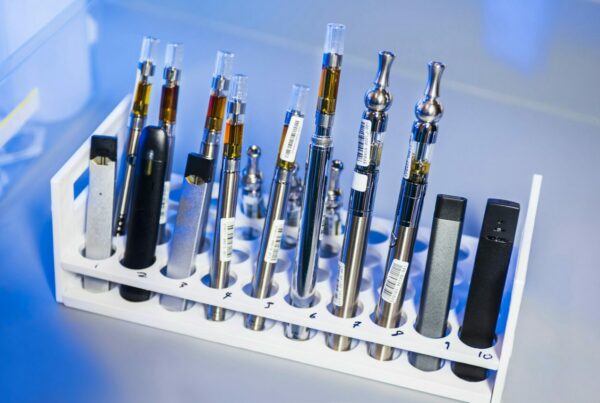N, N-Dimethyltryptamine (DMT) is a substance typically found in both flora and fauna, known for its intense albeit brief psychedelic impacts upon ingestion.
Emerging evidence indicates that DMT, which naturally exists in the human body, plays crucial roles in both the peripheral and central nervous systems and might function as a neurotransmitter.
DMT can trigger strong psychedelic effects; however, it generally doesn’t result in many negative impacts, barring potential cardiovascular problems when administered in large quantities through injection.
Let’s explore DMT and its diverse functions. These roles range from leisure usage to its promising possibilities in scientific exploration and therapeutic uses.

A Brief Overview of DMT: What is it?
| Aspect | Details |
| Name | N, N-Dimethyltryptamine (DMT) |
| Classification | Indole alkaloid |
| Occurrence | Naturally occurs in a variety of plants and animals |
| Psychoactive Effects | Brief, intense psychedelic experiences upon consumption. |
| Method of Consumption | Can be smoked, injected, or consumed orally. |
| Duration of Effects | Brief duration, typically lasting between 5 to 30 minutes. |
| Chemical Structure | Comprises of a tryptamine core with two methyl groups attached to the nitrogen atom of the amine group. |
| Metabolism | Rapidly metabolized by the body, decomposed by monoamine oxidase (MAO). |
| Cultural Use | Historically used in various ceremonial and shamanic rituals by native cultures. |
| Other names | Dimitrifantasia, businessman’s trip, Businessman’s special, 45-minute psychosis, spiritual molecule |
DMT’s Importance in Mental Health
N, N-Dimethyltryptamine (DMT), a substance famous for its potent psychedelic effects, is garnering attention for its potential benefits to mental health. Despite its conventional reputation for inducing vivid visionary experiences, recent research points to a connection between DMT and mental wellness.
Influence on Psychological and Emotional Well-being
DMT, known for its profound psychedelic effects, can trigger significant emotional responses and alter states of consciousness. This might pave the way for new therapeutic methods to address mental health concerns, assist in emotional processing, and provide new perspectives on personal traumas.
Neuroplasticity and Brain Function
Research suggests that DMT might influence neuroplasticity, thus augmenting the brain’s ability to adapt and reorganize. Understanding its impact on synaptic plasticity and neural connectivity could propose potential treatments for conditions associated with neural imbalance.
Potential Therapeutic Use for Mental Health Disorders
Initial studies underscore DMT’s possible role in treating conditions such as depression, addiction, and PTSD. Its ability to induce mystical or spiritual experiences could provide a distinctive approach to psychotherapy and help reframe negative thought processes.
Investigating the natural presence of DMT within the body underscores its significance in mental health resilience, stress management, and overall psychological well-being. Understanding how the body controls internal DMT levels might set the stage for novel therapeutic strategies.
DMT and Mental Health Disorders
| Mental Health Disorder | Description | Effectiveness of DMT | Benefits |
| Depression | A mood disorder marked by persistent sadness, disinterest, and decreased motivation | Early studies suggest DMT could alleviate symptoms by inducing deeply emotional experiences. | Its rapid onset and ability to trigger transformative experiences may provide new therapeutic strategies for reshaping negative thought patterns and enhancing emotional processing |
| Post-Traumatic Stress Disorder (PTSD) | A psychological disorder triggered by traumatic events leading to flashbacks, severe anxiety, and intrusive thoughts | Preliminary research shows DMT’s potential to manage symptoms by inducing spiritual or mystical experiences that could help patients reframe traumatic memories | DMT’s potential to trigger altered states of consciousness could help facilitate emotional processing and offer a fresh perspective on traumatic experiences |
| Addiction | A complex disorder characterized by compulsive engagement in rewarding stimuli despite adverse consequences | Certain studies suggest DMT’s ability to break addictive patterns and reduce cravings for substances | DMT’s ability to induce powerful and transformative experiences could help individuals modify their behaviour patterns and confront underlying factors of their addiction |
Approach to Utilizing DMT
DMT, renowned for its short but potent psychedelic effects, can be administered in various ways. The chosen method often relies on the desired intensity and duration of the experience.
Inhalation:
DMT, when inhaled through a pipe or vaporizer, requires meticulous temperature control to avoid overheating and burning the compound. The psychedelic experience onset is instant when DMT is inhaled, usually lasting from 5 to 15 minutes.
Oral Consumption:
Taking DMT orally produces slower-acting effects, which endure considerably longer, often for several hours. This is due to the slower breakdown of DMT when mixed with an MAOI.
Injection:
DMT can be directly injected into the bloodstream for rapid and powerful effects.
This method leads to an immediate and potent experience, but it requires precise dosage measurement and carries greater risks.
Insufflation (Snorting):
Snorting DMT results in a slower onset of effects compared to inhalation but may deliver a more sustained experience.
Sublingual or Buccal Administration:
When absorbed through the oral mucosa, this method provides an alternative to inhalation and delivers a less intense but longer-lasting experience.
Determining Therapeutic Dosage: N, N-Dimethyltryptamine (DMT)
For inhalation, a dosage of 20 to 40 mg is advised, while for intravenous administration, the suggested dosage is 0.2 to 0.4 mg per kg of body weight. These dosage recommendations are primarily relevant for clinical research, especially for intravenous administration.
- Higher doses administered intravenously are associated with intense visuals, temporary loss of control, and a combined state of anxiety and euphoria
- Interestingly, lower doses have demonstrated less favorable effects
- Recreational doses of inhaled DMT typically range from 40 to 50 mg, occasionally going up to 100 mg
- Different doses of intravenous Reports show that DMT (dosages at 7, 14, 18, and 20 mg) which is associated with near-death experiences, has contributed to substantial and enduring enhancements in psychological health.
Availability of DMT
ProductsOsmosis – 4-ACO-DMT Ethereal Essence Tincture
This tincture is claimed to incorporate 4-Acetoxy-N, N-dimethyltryptamine (4-AcO-DMT), a DMT variant. Tinctures are liquid extracts designed for oral intake, and this particular product may offer a distinctive adventure compared to traditional DMT.
Lucid Supply Co. – 5-MeO DMT Vaporizer
This product is a vaporizer supplying 5-Methoxy-N, N-dimethyltryptamine (5-MeO-DMT). Renowned for its potent, transformative, and often temporary experiences, 5-MeO-DMT is the active component.
Integral Alchemist – Acacia – 1ml DMT Vape Cartridge
The DMT vape cartridge by Integral Alchemist is preloaded with N, N-Dimethyltryptamine. This item is seemingly aimed at those who favor a discreet and convenient manner of consuming DMT.
Deadhead Chemist – 5-Meo-DMT Cartridge
This cartridge houses 5-Methoxy-N, N-dimethyltryptamine (5-MeO-DMT), a compound noted for its deep and powerful effects.
Potential mental health benefits may be linked to personal growth, spiritual experiences, or therapeutic applications aimed at enhancing emotional health.
Deadhead Chemist – N, N DMT Cartridge
Another offering from Deadhead Chemist, this cartridge is filled with the classic N, N-Dimethyltryptamine. Cartridges provide a user-friendly way of ingesting DMT, ensuring a more consistent and controlled experience.
Concluding Remarks
The employment of N, N-Dimethyltryptamine (DMT) in
How does DMT affect mental health?
DMT, through its ability to induce intense and brief psychedelic experiences, opens up new doors for therapeutic techniques.
Preliminary studies point towards its potential benefits in emotional processing, personal development, and possibly
Given the profound impact of mental health treatments, it’s crucial to approach them with careful thought and responsible use.
If you’re keen on responsibly exploring DMT products, reliable resources like Shrooms Toronto Canada Online Dispensary are available to guide you and present assorted options.
Frequently Asked Questions:
How do different DMT products affect mental health?
For instance, vaporizers can produce immediate effects, while tinctures or vape cartridges may provide more steady and regulated dosage.
Incorporating derivative compounds or 5-MeO-DMT can result in varying intensities and diverse effects on mental health.
These minor differences underline the importance of selecting a DMT product based on individual preferences and mental health goals.
Can DMT lead to enduring changes in mental health and personal growth?
Anecdotal evidence suggests that DMT-induced experiences could bring about long-term improvements in mental health and personal development.
Deeply moving or transformative experiences, such as those akin to near-death experiences, are often associated with sustained positive shifts in psychological wellbeing and personal development.
Even though these experiences are intense and short-lived, they frequently lead to introspection, spiritual revelations, and a sense of unity or enlightenment.
People often report a fresh perspective on life, enhanced emotional resilience, and a heightened sense of life appreciation after these experiences.
What is the optimal approach to using DMT for mental health?
It’s crucial to make well-informed decisions, which include thorough research and understanding of the compound’s effects.
Advice from mental health professionals or experienced users can provide valuable insights into possible risks and advantages.
Understanding personal tolerance and mental preparedness is also essential, as is ensuring a supportive and safe environment for the experience.
How does DMT stack up against other psychedelic therapies such as psilocybin or LSD in mental health treatment?
DMT’s effects, duration, and intensity vary from other psychedelics like psilocybin or LSD. It has a notably shorter duration.
Due to the unique experiences that these high-intensity, short-acting psychedelics provide, they call for specific therapeutic methods in mental health. These are different from the approaches used for longer-lasting psychedelics.
Recommended Additional Reading:





